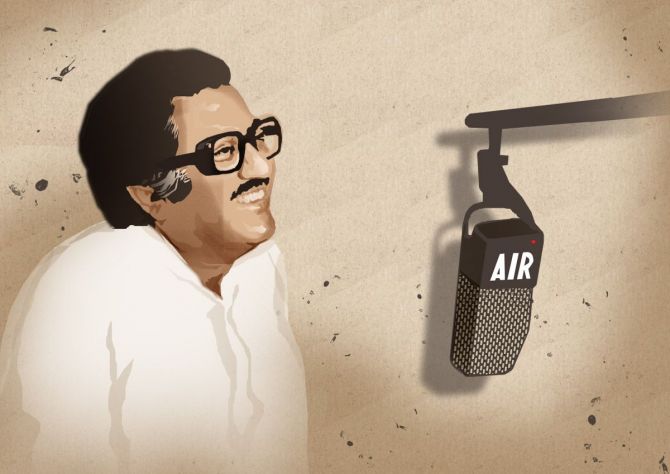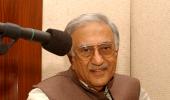For four decades, his voice united millions of Indians for an hour every Wednesday as he brought Hindi cinema's greatest songs in an unparalleled radio broadcast.

Ameen Sayani was The Voice that defined India's Golden generation -- of hardworking women and men of the 1950s, 60s, 70s on whose backs India proudly stands today.
For them, Binaca Geet Mala, the weekly countdown of the top Hindi film songs hosted by Sayani was the only source of entertainment in the pre-television era. They looked forward to the hour-long programme after finishing household chores or a hard day at the office or after their evening studies.
"Wednesday was special to us. We laid bets amongst ourselves on what would be the number one song. Binaca Geet Mala was the only thing we spoke about that day -- before and after the programme," says my mother, filled with sadness when I broke the news of Mr Sayani's passing over the phone this morning.
My mother and her sisters did not have a radio in their home and would seek permission from their strict father to go and listen to Binaca Geet Mala at their married elder sister's house next door.
This was the 1960s; the college-going girls would quickly finish cooking dinner, washing the dishes and other household duties of the large family to make it for the 8 pm broadcast.
The weekly ritual of listening to the programme was one of the highlights of their growing up years -- one that has remained with them and is among the family memories that they have passed down to us. It has been repeated so many times, linked with different people and anecdotes that one can picturise them, sitting together, playing with their long plaits as they intently listened to each song.
The radio was encased in a wooden cabinet, kept under lock and key by the brother-in-law. The lock was opened and the radio brought out a few minutes before the show, and put back inside after the programme ended.
"We waited with such anxious enthusiasm for Ameen Sayani to announce the top song. He carved a unique place for himself which can never be erased. His voice was a virtuous mix of tenderness, romance and magnetism. He will be remembered forever," said my aunt, 78, in a WhatsApp message to my mother.
The most famous radio programme during its time, the Binaca Geet Mala began in 1952 and was hosted by Mr Sayani till it ended in 1994. It was first broadcast over Radio Ceylon and later shifted to Vividh Bharti on All India Radio.
Mr Sayani interspersed the countdown with information about the history, background and behind the scene cinema tidbits which was consumed with relish by listeners who did not have access to this information in the pre-TV/Internet era.
The programme mesmerised millions of India. The streets wore a deserted look during that hour as his mellifluous voice flowed out of every radio/transistor in the country. People stopped everything to listen to Ameen Sayani's countdown.
In 1952-1953, the radio set in my father's home in the village ran on a 'wet battery'. The battery would run out very quickly and took 24 hours to charge. It was sent out for charging every Tuesday without fail for an uninterrupted listening experience on Wednesday.
Later, when my father joined Allahabad University for graduation in the mid-1950s, he and his roommates would listen to the programme at a small restaurant. They would order a cup of tea and sipped it through the hour to ensure that the owner did not throw them out.
Subsequently, a radio was installed by the college authorities in the warden's room. The radio was connected by an extension cord to a speaker which was placed in the common room so that students could listen to the programme.
"Ameen Sayani was the Shahenshah of Melody. His voice has gone silent today, but its echo will ring in our hearts forever," said my father, 84, retired professor of Geography with an enduring love for Hindi films.
The programme brought happiness, comfort and warmth and holds a special place in the memory bank of millions of elderly and middle aged Indians who grew up with Mr Sayani's spectacular programme.
Long before, Chitrahar began airing film songs on Doordarshan in the 1980s [first once and then twice a week], Ameen Sayani's Binaca Geet Mala was the sole source of entertainment of lovers of Hindi films and its music across large swathes of India.
"My roommate had a pocket radio and we would secretly listen to Binaca Geet Mala in my boarding school which was in a remote area," remembers A K Tariani, a school teacher.
One day, the hostel superintendent caught the duo red-handed and meted out severe punishment.
"But we were so addicted that we couldn't stop ourselves from listening to the progamme. Finally, a notice was circulated that we could go and listen to the programme in the students common room with our friends and teachers."
"How happy were those days."
In its successful long run, there were some songs that broke records and continued to reign supreme on the countdown like Man dole, mera tan dole from Nagin [1954], O nag kahi ja basiyo re from Nag Panchami [picturised on Nirupa Roy who came to be identified with mother roles in the 1970s] and Ina Mina Dika from Aasha [1957], Yeh zindagi usi ki hai from Anarkali [1953] etc...
"His style of speaking was unique. He spoke in a mix of Hindi and Urdu. We were so captivated by it that we tried hard to imitate him, but alas, we couldn't because Ameen Sayani was Ameen Sayani," my father remembers.
"No one could copy him"
Feature Presentation: Aslam Hunani/Rediff.com











 © 2025
© 2025